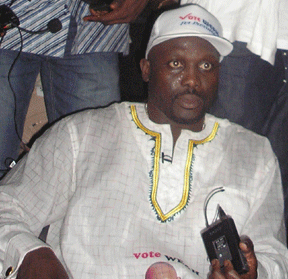The Perspective
Atlanta, Georgia
April 22, 2006
 |
|
George Weah
|
Most people are aware that Mr. George Manneh Weah was appointed a UNICEF Goodwill Ambassador on April 7th, 1997. The honorary appointment was based on his humanitarian work with the youth of Liberia during that country’s most turbulent times. He was also recognized and honored for his vital support for HIV/AIDS education programs and projects in Ghana and Liberia.
Mr. Weah served in that honorary position with great esteem until he officially declared his candidacy for the Liberian presidency during our last national elections. A communiqué issued by the United Nations in May 2005 stated: “According to UN rules, Goodwill Ambassadors cannot serve the organization while engaged in political activities. As a result, he has temporarily stepped aside from his role with UNICEF.”
So, if Mr. Weah is no longer an honorary UN Goodwill Ambassador, why is he continuously being referred to as Ambassador? Is it one of those African traits where the fascination with titles sometimes exceeds rational thought? No, here is the story.
Before Mr. Weah was appointed UNICEF Ambassador, he had been named “Sports Ambassador” of Liberia sometime in the 1990s – I gather the honor was bestowed during the interim administration of Dr. Amos Claudius Sawyer. An official passport was issued to him and he began to travel as a diplomat. Mr. Weah continued to officially hold the post of Sport Ambassador during the next administration (under Charles Taylor) and recently during the interim administration recently ended.
Does the Ellen Johnson-Sirleaf administration have a responsibility to honor him as ambassador? No. But it would seem logical that for Ambassador Weah to be relieved of the honor bestowed upon him by a past administration, this administration does have a responsibility to officially inform him that he has been decommissioned. Until such time that he has been officially relieved of his position (although it is technically only an honorary position), he does have a claim to the title, it is logical to assume; hence the designation Ambassador George Manneh Weah.
The Fiasco at Roberts International Airport
The issue of ordinary citizens traveling on diplomatic passports is a question that needs to be hurriedly and stringently addressed by this administration. Does that make the holders of such official documents criminal? No. The criminals were those government officials who issued the books knowing these weren’t officials of government or diplomats.
How does a government that has pledged to be user-friendly handle such an irritating but controversial issue? Simple, It must do so through effective communication. The government has a responsibility to develop and maintain an effective system of communication. That being the case, it is logical to conclude that the fiasco that happened at Roberts International Airport was due to “a failure to communicate”, to borrow a famous saying.
The Chief Executive should have directly ordered the Ministry of Foreign Affairs to issue an official announcement. This announcement should have been placed in all local dailies and run on all local radio and television stations. All holders of diplomatic and other official passports who are not government officials should have been given adequate time and instructions to correct the oversight in an orderly and civil way. The Ministry of Foreign Affairs could have facilitated the issuance of ordinary passports to those who didn’t qualify to hold official ones without humiliating them.
Instead, we have what turned out to be a fiasco last
weekend. There is evidence now that the incident was
reported in exaggerated form. For example, a news
headline at Radio Free Liberia read: “Liberian
Government Arrests and Detains Ambassador George Weah”.
In that news story, the Congress for Democratic Change
allegedly blamed President Ellen Johnson-Sirleaf because
it claimed “state security at the Roberts International
Airport that effected the reported of Ambassador Weah
were directly answerable to President Sirleaf”.
By the next day, the CDC was threatening to sue the
Liberian government for the alleged incident. In retrospect,
we now know it wasn’t that bad actually.
But the government put itself in this predicament because of its inability or lack of desire to implement a proactive plan. The government found itself being defensive; after many interviews by various government officials including the Minister of Information and the Commissioner of Immigration among others, it was obvious the government was doing a bad and unnecessary job of damage control. Presidential Affairs Minister Morris Dukuly reportedly said, “What obtained at the RIA was not an act of state, but by some low echelon personnel.”
No, Mr. Minister, even officials at the lowest rung of the pyramid represent the government and the government does bear responsibility for their actions. The government has a responsibility to hire and train personnel correctly to avoid such a snafu. I’m still optimistic this government has a good chance at succeeding because it consists of many highly trained professionals, bureaucrats, technocrats and politicians, but so far, their collective performance is not up to par. We bid them Godspeed.
Update: It has just been learned that the Government of Liberia has agreed to appease Ambassador George Weah and his angry constituents and officials of the CDC for the government’s fiasco. What is the appeasement? It has just been reported that the government is underwriting the aborted trip to express its remorse. What is the moral of this story: Stupid mistakes can be very costly. This is not a wise way for this poor government to spend the people’s money, but if it keeps making blunders, it must keep paying to save face; it eventually could become very expensive.
